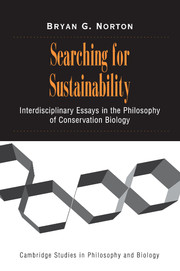Book contents
- Frontmatter
- Contents
- Searching for Sustainability
- General Introduction: An Interdisciplinary Experiment
- I PRAGMATISM AS AN ENVIRONMENTAL PHILOSOPHY
- 1 The Constancy of Leopold's Land Ethic
- 2 Thoreau and Leopold on Science and Values
- 3 Integration or Reduction: Two Approaches to Environmental Values
- 4 Convergence Corroborated: A Comment on Arne Naess on Wolf Policies
- 5 Pragmatism, Adaptive Management, and Sustainability
- II SCIENCE, POLICY, AND POLICY SCIENCE
- III ECONOMICS AND ENVIRONMENTAL SUSTAINABILITY
- IV SCALING SUSTAINABILITY: ECOLOGY AS IF HUMANS MATTERED
- V SOME ELEMENTS OF A PHILOSOPHY OF SUSTAINABLE LIVING
- VI VALUING SUSTAINABILITY: TOWARD A MORE COMPREHENSIVE APPROACH TO ENVIRONMENTAL EVALUATION
- Index
4 - Convergence Corroborated: A Comment on Arne Naess on Wolf Policies
Published online by Cambridge University Press: 21 January 2010
- Frontmatter
- Contents
- Searching for Sustainability
- General Introduction: An Interdisciplinary Experiment
- I PRAGMATISM AS AN ENVIRONMENTAL PHILOSOPHY
- 1 The Constancy of Leopold's Land Ethic
- 2 Thoreau and Leopold on Science and Values
- 3 Integration or Reduction: Two Approaches to Environmental Values
- 4 Convergence Corroborated: A Comment on Arne Naess on Wolf Policies
- 5 Pragmatism, Adaptive Management, and Sustainability
- II SCIENCE, POLICY, AND POLICY SCIENCE
- III ECONOMICS AND ENVIRONMENTAL SUSTAINABILITY
- IV SCALING SUSTAINABILITY: ECOLOGY AS IF HUMANS MATTERED
- V SOME ELEMENTS OF A PHILOSOPHY OF SUSTAINABLE LIVING
- VI VALUING SUSTAINABILITY: TOWARD A MORE COMPREHENSIVE APPROACH TO ENVIRONMENTAL EVALUATION
- Index
Summary
I have argued elsewhere that Deep Ecology, understood as a social movement seeking to redress currently unacceptable environmental policies by embracing the belief that nature has intrinsic value, has failed to articulate policies that are both plausible and significantly different from the policies implied by a broad and long-sighted anthropocentric viewpoint. The convergence hypothesis, which I have offered as an alternative to the traditionally divisive characterization of environmentalists as split between “shallow”, anthropocentric, resource managers and “deep”, nonanthropocentric, environmental radicals, states that, provided anthropocentrists consider the full breadth of human values as they unfold into the indefinite future, and provided nonanthropocentrists endorse a consistent and coherent version of the view that nature has intrinsic value, all sides may be able to endorse a common policy direction.
The convergence hypothesis is a general empirical hypothesis about policy – it claims that policies designed to protect the biological bequest to future generations will overlap significantly with policies that would follow from a clearly specified and coherent belief that nonhuman nature has intrinsic value. The convergence hypothesis is a contingent truth, a very general empirical hypothesis which shapes solutions sought by adaptive managers in particular situations. It is supported by facts both directly and indirectly; it could be falsified, but so far it has not been. The purpose of this “Comment” is to test that hypothesis through an examination of Arne Naess' thoughtful and interesting discussions of policies appropriate in “mixed communities” – communities that include both humans and large predators.
- Type
- Chapter
- Information
- Searching for SustainabilityInterdisciplinary Essays in the Philosophy of Conservation Biology, pp. 78 - 87Publisher: Cambridge University PressPrint publication year: 2002



